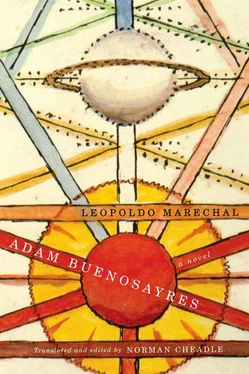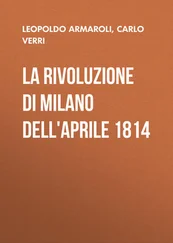The infernal environment spreading before us was an expanse of muddy pampa. No tree, no weed, no colour interrupted the black surface of the quagmire, where despots and traitors squelched around beneath a rainy sky, busy at who knows what tasks. As soon as the sky brightened, I noticed dark shapes sprouting up from the quagmire and swelling in a process of swift vegetal growth: they were earthen horses, colts of wet mud. Then I saw how the despots, unrecognizable under their layers of muck, headed for those equine forms, frantically mounted them, punished their flanks with their heels, shouted to spur them on. But the earthen horses remained motionless, collapsed under the weight of their riders, fell apart like clods of mud, and finally crumbled, dragging the horsemen down with them. And then, after laboriously floundering in the mud, the despots got up and mounted other horses and fell to earth again. As for the traitors swarming in the quagmire, I’ll be brief: they had the shape of half-men, each having half a head, half a thorax, and only one arm; they hopped along on their lone foot, anxiously searching for their other, betrayed, half.
The last sector of the hell of Wrath, it turned out, belonged to the assassins. Stranglers, dismemberers, poisoners, all the models of man as tiger, serpent, and hyena were there, encased in coarse hospital gowns and stretched out on nickel-plated operating tables. Intense spotlights blinded them and cast their features in relief with the implacable sharpness of mug shots. Hovering over the assassins, walking around the operating tables, cackling and febrile, a hundred demon-psychiatrists in white lab coats were measuring their skulls, pricking their nerve endings, extracting glandular fluids, pawing them over and submitting them to vexatious experiments. A vulture-faced assassin, who had managed to escape from his operating table, ran up to us:
— I’d like to meet the guy who invented this inferno! he griped, staring me in the face.
— What for? Schultz asked him.
— To tell him where to get off. He’s gotta be either an avant-garde type or a bungler. Any sophomore student would have known enough to set this hell up as a deluxe butcher shop, with nice big hooks, knives, saws, and cleavers. Where was the turkey’s head? Shoving us into this dump, with a bunch of weird medics scratching away night and day at our grey matter!
The astrologer, all the while listening to him, leaned over and discreetly whispered in my ear:
— Take a good look at him. He’s an old-school murderer.
He was just turning to respond to the vulture-faced fellow, when he saw him flailing amid a throng of psychiatrists as they dragged him back to his table. Only then did we come face to face with the Man with Intellectual Eyes.
Tall, gaunt, aquiline of profile, the Man with Intellectual Eyes was wearing blue trousers and a chamois jacket. But his ashen-grey eyes were his most striking feature; as they peered they emitted a disquieting light.
— The green fly hasn’t come back to buzz in front of my eyes, he announced, his voice tranquil and confidential.
— It hasn’t come back? Schultz asked him.
— It couldn’t come back anymore. The three fateful sisters haven’t returned either.
— It is just.
— You said it, affirmed the man. Now there reigns the peace of an evenly balanced scale. Yes, some invisible weigh-scale has come to rest, with its two pans at the same level.
He must have noticed my astonishment and great curiosity, because he turned to Schultz and asked, pointing at me:
— Does the gentleman not know the story?
— I know nothing, said I, about any green fly or three fateful sisters.
The man seemed to recover an extinguished fervour, and his disquieting ashen eyes grew moist:
— Let me tell you about Bellona! he implored us. When I was a happy mortal and worked with the language of men, I described strange affections and introduced strange intrigues into the passions of others. Now I need to talk about myself. Give me the chance to deliver my monologue! Not the terrible inner monologue that wracks my being in this night of punishment, but the other kind, which one delivers before an understanding face, so it seems less a monologue than a dialogue between a voice and a gaze. May I speak of Bellona?
And since he’d read tacit consent in our faces, the Man with the Intellectual Eyes took us aside to a free spot and spoke in this way:
— I shall not give you my name, although you may have heard of me up above and associated my name with the death of a literary promise. My first comedy, The Invaders , premiered by chance at a theatre in Buenos Aires and unexpectedly plunged me into the flattering world of notoriety. And so I became a demiurge of theatrical fables, proudly manipulating a hundred destinies not my own. Little did I know, or else I’d forgotten, that I too (and forgive me the cliché) was a comic character on the great stage of the world, dangling from threads manipulated by the invisible fingers of angels and demons. It was in those days that I met Bellona.
He paused here, apparently trying to gather into his soul the shards of a broken image.
— Every time I pronounce Bellona’s name, he declared, I say it as the poet rereads his unfinished and unfinishable poem. 151Or as one names a truncated happiness, remembered less as something that actually was than as something that might have been. Bellona was the only child of an artillery captain. She grew up in the care of others and, in her solitude, she developed the traits of a soul which I never managed to define. For her soul used to open and close unexpectedly before my awareness, such that I caught only glimpses, a quick succession of bright and dark zones within her. As for the name of that incredible woman, Bellona — its rarity and musicality aside — I saw nothing premeditated about it at first, no occult meaning, no hint connecting Bellona to the genius of war. Except perhaps her hair of bronze — she used to wear it gathered in the form of an ancient helmet.
”Our honeymoon was one of mutual discovery. We spent it in Mar del Plata, during a season of steady summer weather uncommon in that maritime city. Bellona and I had taken a house on the edge of town. A cheerful-looking residence, its large windows looked out over the Atlantic, especially those in the living room, which we converted into a studio. There Bellona installed the objects we loved — pictures, books, tapestries, my old harmonium, her bird cage, and the models of set designs I used when hatching plots for my plays. I mentioned an initial bedazzlement, when Bellona and I were like two worlds commingling, laughing in the astonished delight of gradual discovery, not yet suspecting that love is sometimes the most terrible form of solitude. But after our rapturous beginning, when my eyes again saw reality as it is, I began to feel something was not quite right in that happiness-machine Bellona and I had built.
— Naturally! I interrupted him. The first rapture, or rapturous mode of looking at one’s beloved, so they say, is the only view love can take. Saying that the rapture is over and that one “sees reality as it is” is tantamount to announcing love’s death.
The Man with Intellectual Eyes regarded me with affectionate curiosity.
— I didn’t mean to go that far, he rejoined. The initial rapture to which I referred is not the rapturous mode of looking at the beloved, but rather the rapturous mode through which the lover looks only at himself in the act of his own rapture.
— Another form of solitude, grumbled the astrologer at this point.
— Very well said! affirmed the Man with the Intellectual Eyes. But once that rapture has dissipated, a true lover will want to know what it is he really loves.
Читать дальше












